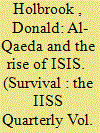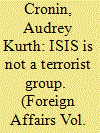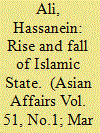| Srl | Item |
| 1 |
ID:
139028


|
|
|
|
|
| Summary/Abstract |
Ayman al-Zawahiri’s leadership of al-Qaeda has been beset by a series of calamities that threaten the viability of the movement’s core group and its legacy. Zawahiri was always more suited to be second in command, offering dense strategic and ideological deliberations rather than acting as the public face of a global Islamist militant movement. Replacing the charismatic Osama bin Laden was thus always going to be a challenge. The fact that secular Arab rulers, especially in Egypt (Zawahiri’s native land and a consistent preoccupation of his), have been toppled on his watch through popular uprising and military intervention – as opposed to jihadist coercion – has further undermined Zawahiri’s position as al-Qaeda leader. The Arab Spring uprisings demonstrated the success of regime-change methods that al-Qaeda had consistently dismissed, while removing some of the main protagonists of its grievance narrative.
|
|
|
|
|
|
|
|
|
|
|
|
|
|
|
|
| 2 |
ID:
137581


|
|
|
|
|
| Summary/Abstract |
After 9/11, many within the U.S. national security establishment worried that, following decades of preparation for confronting conventional enemies, Washington was unready for the challenge posed by an unconventional adversary such as al Qaeda. So over the next decade, the United States built an elaborate bureaucratic structure to fight the jihadist organization, adapting its military and its intelligence and law enforcement agencies to the tasks of counterterrorism and counterinsurgency.
|
|
|
|
|
|
|
|
|
|
|
|
|
|
|
|
| 3 |
ID:
138609


|
|
|
|
|
| Summary/Abstract |
In June, the Islamic State of Iraq and al-Sham (ISIS) made a dramatic entrance onto the global stage, aiming to establish its religious authority across the planet under a caliphate led by Abu Bakr al-Baghdadi. The group’s principal tool for expanding its influence has been brute force, but as it has attempted to build credibility and establish legitimacy, it has shown a deftness
for propaganda, using social media and cyber technology to recruit fighters and intimidate enemies.
|
|
|
|
|
|
|
|
|
|
|
|
|
|
|
|
| 4 |
ID:
182243


|
|
|
|
|
| Summary/Abstract |
What,” I sometimes ask students in a class I teach on
the history of terrorism,
“was the name of the Islamic State’s
branch in Europe?”Itis a trick question: the Islamic State (also known as
ISIS) never set up a full-Èedged European branch.Thegroup’s self-proclaimed
caliph, Abu Bakr al-Baghdadi, knew
better than to try.By2014,when ISIS
formalized its split from al Qaeda and
established itself as the dominant
player in the global Sala¼-jihadi movement, Western security services had
¼gured out how to make it eectively
impossible for the group to establish a
base of operations in Europe or North
America. Like al Qaeda before it, ISIS
was only ever present in theWe s tin the
form of disparate cells and sympathizers.
|
|
|
|
|
|
|
|
|
|
|
|
|
|
|
|
| 5 |
ID:
171872


|
|
|
|
|
| Summary/Abstract |
The Islamic State (IS) is one of the most prominent transnational terrorist jihadist organizations. In 2013 and 2014, IS was able to control large swaths of Syria and Iraq, roughly the size of Britain, and announced the establishment of what it called the “Caliphate State”. The organization was defeated militarily through a long war on the Iraqi and Syrian fronts. Many local, regional and international parties participated in this war. In October 2019, IS's leader, Abu Bakr al-Baghdadi, was killed in a US raid at his safe house in the Syrian province of Idlib. This article will discuss the reasons of the rapid expansion of the IS, analyze the sources of its strength and assess the repercussions of its military defeat and death of its leader on its ability to survive, as well as foreseeing its future.
|
|
|
|
|
|
|
|
|
|
|
|
|
|
|
|